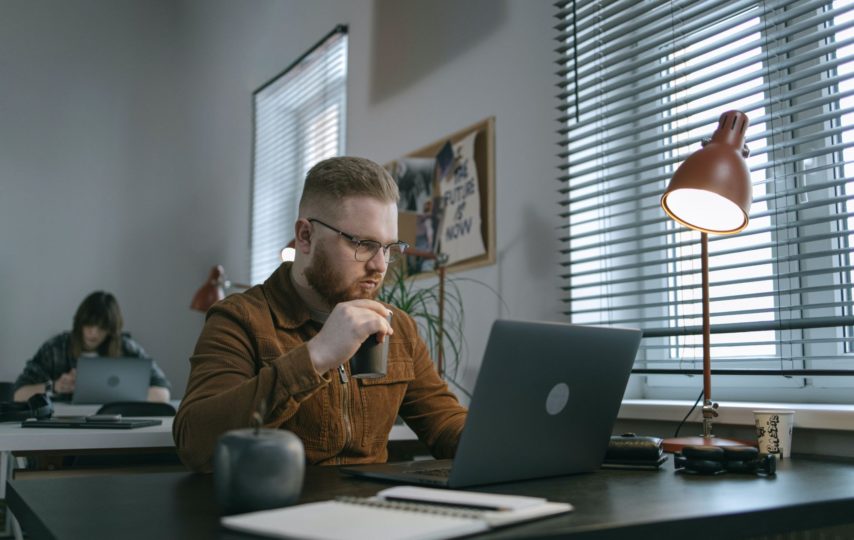Have you ever taken a 5-minute break from work, which somehow turned into 30 minutes? Or, did you ever realize your brain did not process any information midway into reading a document? If so, you are not alone.
Being able to focus on a piece of work until it is done is one of the key contributors to future success. However, the world around us is full of distractions. You may have a time-wasting habit of frequently turning to social media. Our brain sometimes gets tired too. Fortunately for you, there are several ways you can rejuvenate your brain to focus on tasks. So, hurry up and try out one or all of the following 10 ways to focus more at work.
Develop an hourly work plan
Try to create an organized schedule for your day’s work on an hourly basis. This way, you would know what exactly you need to accomplish by the end of the day and what steps you would follow to reach that point. When you do not have a plan, you do not have a good idea of what pace to go at for the day. It is also likely to make you tenser. Thus, you lose attention at work.
Do not forget to incorporate breaks into your routine. Your workflow will not go smoothly unless you take breaks to recover and re-energize your brain. Insert a nap period after lunch, tea time, and perhaps a reading period in the afternoon.
Make realistic estimates of how much time it would take to complete each task. Sort out your priorities. Find out the more important tasks and schedule them for the morning when you are likely to operate at the highest energy level. The hourly work plan will help you get into a workflow.
You will be sure of what to do one after the other, and this will help reduce some tension. Set deadlines for each task, and you will feel more rewarded with each task you complete. Your productivity will rise.
Avoid multitasking as much as you can. When you toss between answering emails, filling out reports, and googling “write my paper for me” due to your night school missed assignment, you can quickly get nervous and start juggling things together to complete tasks fast. But, anxious multitasking will only slow you down. Continually switching between tasks will make you weary and lose focus.
A study by the American Psychological Association showed that going back and forth between multiple tasks decreases the chances of completing any one of them in a timely manner. Productivity falls by 40%. When you create a work plan, group the similar tasks together. This will avoid multitasking and smoothen the transitions between activities.
When you have a big task to complete, do not panic. Break it into smaller, easily doable work activities. You will feel more relieved every time you complete each of those smaller tasks until you are done with all of them. Furthermore, you will be well aware of how to proceed with each task.
For instance, you can divide a project into broad categories of planning, creating a framework, and developing. Then, you can narrow them down into small tasks with realistic goals.
Organize Your Workspace
Your brain is directly affected by the organization of things around you. If your workspace is a mess, you will feel lost. Research by Princeton University concluded that a cluttered visual environment impedes our brain’s capacity to focus and diminishes our cognitive functions. The more the number of objects in the visual space, the harder it is for the brain to sort through them.
Think about all the stuff you need every day. Keep only those on the desk and leave the rest at home or elsewhere. A neat workspace helps organize your thoughts as well. It takes little time to clean up your desk, but it has a big impact on improving focus at work and enhances productivity.
Find Inspiration In Your Work
If you are working on a task simply because your boss told you to and not because you find some motivation in it, it becomes very difficult to pay attention. Demotivation arises from a lack of purpose, which tends to make us procrastinate more. This is why it is so important to find inspiration in each task at hand. It improves your optimism regarding the outcome. You look forward to completing the task and seeing the results.
However, it is not always easy to feel motivated at work. Before you begin working on specific work activity, think about what would change positively after its completion. You might gain satisfaction simply from ticking something off the worklist. Or, there could be better outcomes awaiting you.
Exercise Regularly
It is important to exercise regularly to stay fit and keep the brain working. Morning exercise is a great way to give yourself a head start. It is not only good for your overall physical well-being, but it develops a sense of achievement that you can carry on with for the rest of the day. Thus, morning has a psychological effect on you. Moreover, exercise stimulates better blood circulation, and morning exercise will spark your brain and help you focus more at work throughout the whole day.
However, this does not mean evening exercise is not useful. We usually exercise in the evening to get rid of tension or stress accumulated over the day. On the other hand, morning exercise has consistency with your life values and how you see yourself progressing while seeing the beginning of a new day.
You can also create peer groups for exercising if that is what motivates you. Try to give yourself some reward for sticking to a morning routine. This has a positive reinforcement effect, where you pair something pleasing with the exercising behavior.
Shift work can make it difficult for you to create an exercise routine. Check your schedule, practice, and figure out what time is the best for you to exercise and benefit from it.
Take a walk
Taking a walk is a specific form of exercising. You could go on a relaxing walk with your favourite colleague during the midday break. It sparks the growth of nerve cells that leads to enhanced brainpower. Researchers at Stanford University proved that walking improves people’s ability to come up with creative ideas. In fact, walking boosted people’s creative output by 60% during cognitive thinking.
The journal Neurology published a paper where researchers found that the subjects who walked longer distances per week retained more of their cognitive function and had a greater attention span.
Scandinavian Journal of Medicine and Science in Sports published a study that said walking three times a day for thirty minutes during lunch break made people feel more enthusiastic, relaxed, and less nervous at work. These effects are directly tied to increased productivity.
Take a 20 minute Nap
People especially feel tired between 1:00 PM and 3:00 PM in a post-lunch crash. Most try to overcome the fatigue by loading themselves with coffee or sugary delights. However, this tiredness is your body telling you that it needs rest.
Without a nap, your productivity will drop. Take a 20-minute power nap after lunch to restart your body and feel refreshed, energized, and more motivated. It will let you focus more at work afterward. In fact, studies have shown that a 20-minute nap energizes the body, equivalent to more than 2 cups of regular coffee.
Read a Book
Extensive periods of concentration can easily steer the focus away from the task at hand. In such a case, take a short break and read a book. Reading invigorates the part of the brain that deals with attention and memory. A little bit of reading every day helps increase focus and improve your memory.
While reading, the focus put on written words can also reduce stress by relieving the mind of the pressures and tensions of the day. If you are an avid book reader, reading will likely help you the most. It will not only be entertaining but also peaceful.
Drink Green Tea
You might want to drink a cup of green tea during your break. As opposed to coffee, green tea contains a compound called l-theanine along with caffeine. The l-theanine is an amino acid that is naturally present in green tea. This compound is known for triggering increased calmness and alertness.
In addition, the caffeine in green tea would increase brain activity, reduce reaction time, and decrease both physical and mental fatigue. Altogether, green tea would let you focus more at work.
Remove Meaningless Distractions
Is your phone constantly buzzing to let you know your friends posted on Instagram or sent you a snap? Well, that would surely distract you from work. Plus, notifications never really stop coming, do they? A survey found that an average worker spends 56 minutes a day on their smartphones for non-work activities. You might feel social media acts as a good diversion from work stress.
However, mindless browsing through social media actually drains your energy further since you have to process loads of information. You take a break for 5 minutes that suddenly turns into 30 minutes, and you feel even more worried about completing the task at hand.
To focus more at work, follow your work plan and turn off your notifications during busy hours. You might need to use the Internet during work, so turning off the WiFi is not a good idea. Create a list of all the distracting websites and block access to them for as long as you need. Nicely let your colleagues know not to approach you during your busy hours unless it is about something urgent. Tell your friends and relatives when you will have free time for them to call you.
Manage Your Emails
It has become very common to communicate through emails for work-related matters. Our inbox tends to get filled with emails from different stakeholders. Consequently, checking emails now and then can become a habit. A study by The New York Times found that it is healthy for us to check emails less frequently.
Fix a time for checking your emails instead of visiting your inbox every now and then. It could be anytime during the first hour after you arrive at the office. The second time could be right after lunch break. It takes little effort on your part to improve productivity this way.
Or, you could check your emails once every 3 hours if you are expecting important emails more often. You might find it useful to batch several emails and reply to them at once. This would save a lot of your time every day.
Additional Tips For Consistency
Here are some additional tips that will ensure consistent results for your efforts and to help you focus more at work:
- Drink more water and keep a bottle at arm’s reach. There is no substitute for water when it comes to dealing with fatigue. You might drink coffee or green tea, but never forget to drink a sufficient amount of water every day to stay healthy and focused.
- Get an adequate amount of sleep every day – 7-8 hours a night. Make sure you are not overworked and consistently sleep-deprived. A good night’s sleep goes a long way in helping you keep focus.
- Add fuel to your body by consuming a healthy balance of proteins, carbohydrates, and good fats. Carry snacks to work consisting of fresh fruits or nuts. According to Harvard Medical School, berries, walnuts, leafy green vegetables, fatty fish such as salmon are the best for your brain.
The Bottom Line
At the end of the day, it is all about your attitude towards your work. In order for any of the tips above to work, you must be willing to make every moment count. You might need to make some adjustments that will push you out of your comfort zone. You might have to try out new things.
Hence, you must be determined to change all your time-wasting habits and work hard on maintaining good productivity.
So, how far are you willing to go to focus more at work?





